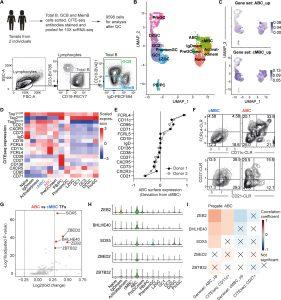What was once considered “junk cells” called Atypical B cells (ABCs), might not be junk at all. A new study reveals ABCs are key players in fighting infections like malaria, offering exciting possibilities for new treatments.
Scientists have long observed ABCs in people with diseases like malaria and lupus, but their role was unclear. In this study they were wanting to understand how these cells arise and whether they help or hinder our defences (Figure 1).

Figure 1: Single cell RNA-seq of human tonsillar B cells identifies TFs associated with the ABC lineage. (A-I) Human tonsil (n = 2) total B cells, GC B cells and memory B cells were sorted, labeled by CITE-seq antibodies and mixed at 1:1:1 ratio for 10X scRNA-seq. The data was processed through Cellranger pipeline and analyzed by Seurat package. (A) Experiment design and gating strategy for sorting. (B) UMAP of B cells with identified clusters. (C) Feature plot showing the average expressions of ABC and cMBC gene sets. (D) Heatmap of surface marker expression of all identified clusters by CITE-seq. (E) Statistics showing the relative expression of indicated surface markers in ABC comparing to cMBC. The deviation values were calculated as ABC CLR median value minus cMBC CLR median value. (F) Representative FACS plot showing the expression of indicated genes by CITE-seq. (G) Volcano plot comparing the expressions of TFs in ABC and cMBC, the top5 TFs were highlighted. (H) Stacked violin plot showing the expression of the top5 TFs in all clusters. (I) Pearson correlation tests between TFs expression and indicated features in each cell in ABC cluster were performed and the summarized as heatmap.
The results were surprising – ABCs weren’t just harmless bystanders; they were key in the immune system function. The study found ABCs help in two key ways:
Boosting T cell helpers: These “helper cells” are essential for generating antibodies. ABCs play a vital role in developing these helpers, strengthening the body’s defences against malaria parasites.
Directly attacking the enemy: The study also suggests ABCs might have their own ways of tackling harmful infections, adding another layer to their defensive capabilities.
Using gene-editing, researchers identified a gene called Zeb2. Mice lacking this gene couldn’t control malaria infection, highlighting the crucial role of ABCs in this battle.
The discovery doesn’t just benefit malaria research. Since ABCs also appear in autoimmune diseases like lupus, understanding their role could lead to new treatments to control these conditions.
Journal article: Gao, X., et al. 2024. Zeb2 drives the formation of CD11c + atypical B cells to sustain germinal centers that control persistent infection. Science Immunology.
Summary by Stefan Botha
